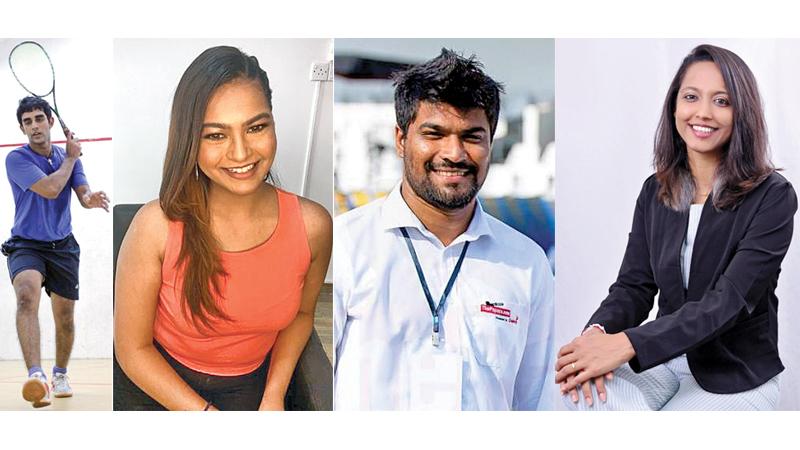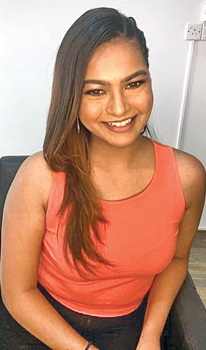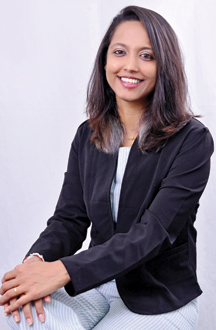
The Tokyo Olympics delivered much sporting drama and unexpected wins. The Sri Lankan team had athletes representing the country in events such as gymnastics and equestrianism for the first time.
Even though the athletes didn’t qualify in their respective sport, the representation inspired the younger generation to do sports. One day, a medal or medals will be possible.
Youth Observer spoke to a few sports enthusiasts about the sports structure, sports at school and what needs to change to achieve international sporting events in the future.
****
It’s important to invest in and develop infrastructure for athletes to pursue sports
Dilshan Senaratne, former CEO Cyaniq Global LLC. Marketer and international squash player
Q: Do you think the school sporting structure is inadequate for aspiring sportspersons to perform internationally?
 A: Actually I think we have a healthy sporting system at the school level. I can’t speak for all sports but in my experience having represented the country in squash, and being ranked in the Men’s Open category while still in school; I think our school-level sporting system is healthy.
A: Actually I think we have a healthy sporting system at the school level. I can’t speak for all sports but in my experience having represented the country in squash, and being ranked in the Men’s Open category while still in school; I think our school-level sporting system is healthy.
The actual challenge is in bridging the gap between school and national levels. The only real way to fill this gap is to invest in developing strong recreational, domestic, club and mercantile circuits. Most top-level school athletes give up their sporting career when they come out of school and that drain impacts the levels of competition across all levels of sport in the country.
Having said that, there is a definite lack of expert knowledge in areas such as sports psychology, nutrition, supplementation and injury management at the school level. The infrastructure outside of Colombo also might require improvement, but having been schooled in Colombo, I can’t speak to that.
Q: Do you think more attention is given to studies and not much or at all to sports?
A: Academic pursuits certainly limit the number of athletes who continue their sports late into their careers. Given our country’s socioeconomic context it isn’t viable to try and change that reality.
However, it’s extremely important to invest in and develop infrastructure to allow athletes to pursue their sports as economically stable career options. This ties back to my earlier point of having club, mercantile and domestic set-ups that yield opportunities for professional athletes.
Q: What do you think is lacking in the school sporting structure, and how can it be changed?
A: The psychological aspects of competition are probably not recognized well enough in Sri Lanka. Mindset plays a big role when competing at the highest levels, and we tend to have trouble understanding and enabling our athletes to prepare well enough psychologically.
In addition to that, nutrition, supplementation, strength training, recovery, injury management, performance management and peaking are also areas we should place focus on at the school level.
Q: What sports did you play, and how did it help you shape your life?
A: I played squash very seriously for 12 years, since I was 13. I was able to represent Royal College, the Sri Lanka Air Force, CH & FC as well as Sri Lanka throughout my career. I toured multiple countries to represent the country and gained a lot of exposure at a very young age. I also played basketball at club, mercantile and District levels following my dad’s passion for it. Unfortunately, I don’t play either sport at present.
I think sport is the ultimate builder of character and competition plays a major role in shaping mindset. Personally, my competitive drive is something I thank my sporting background for.
Q: What advice would you give those who wish to make sports a career?
A: I honestly believe that those who are passionate enough to follow their dreams whether it’s in sports or in anything else are destined to succeed, so long as they are willing to put in the necessary hard work.
Being a developing country, sporting is perhaps not the most obvious career choice but it’s certainly a rewarding one. I think there are opportunities available and that with some planning and hard work, there is potential for anyone to make a career in professional sporting.
****
School sporting structure across the island is disproportionate
 Dasuni Athauda, news presenter, law grad. Played netball
Dasuni Athauda, news presenter, law grad. Played netball
Q: Do you think the school sporting structure is inadequate for aspiring sportspersons to perform internationally?
A: I think the school sporting structure across the island is disproportionate in terms of facilities; so students in rural schools are often at a disadvantage even when they are talented.
Q: Do you think more attention is given to studies and not much or at all to sports?
A: I don’t think so; but this is based on my personal experience, our school always encouraged us to balance both sports and academics since primary school; so I never saw it that way.
Q: What do you think is lacking in the school sporting structure, and how can it be changed?
A: I think the school sporting structure is sometimes too focused on winning rather than teaching the true spirit of sport which often takes away the joy and real value of sports and gives unnecessary pressure.
Q: What sports did you play, and how did it help you shape your life?
A: I played Netball mostly at national level and participated in many other sports at inter-house level and most of them were team sports so I loved the fact that I got to do something other than just academics and studying with my friends and make a lot of fun memories too.
Q: Your advice to students who wish to make sports a career?
A: It might not be the conventional way of doing things but if you are determined and if you know you’ve got what it takes then you need to put your 100% and go with it and not give up.
****
Students, irrespective of gender must engage in team sports
Damith Jerome Weerasinghe, Head of Cricket at ThePapare.com. Cricketer and athlete
Q: Do you think the school sporting structure is inadequate for aspiring sportspersons to perform internationally?
A: The current school sporting structure in Sri Lanka is vastly spread around the island but in terms of the facilities, technology and financial support are not up to international standards.
 For obvious reasons, we haven’t had much success internationally in the age-group categories except for a few instances. Some sports are generally played only in major cities such as Colombo, Kandy and Galle. Therefore, it is imperative, we break that system and take the sports deep into the villages to unearth talent.
For obvious reasons, we haven’t had much success internationally in the age-group categories except for a few instances. Some sports are generally played only in major cities such as Colombo, Kandy and Galle. Therefore, it is imperative, we break that system and take the sports deep into the villages to unearth talent.
Q: Do you think more attention is given to studies and not much or at all to sports?
A: Yes, I believe the current education system is more focused on studies. Students irrespective of gender, must engage in a team sport or at least an individual sport. Sports build character and instil discipline in a human being. That’s how I see it. Of course, studies are important but if Sri Lanka succeeds as a sporty nation, we need to give a little more focus to sports at the school level too.
Q: What do you think is lacking in the school sporting structure, and how can it be changed?
A: The processes and policies must be set in place with a long-term plan to improve the standards. The policies must be to create a society attached to sports in their day-to-day life. Be it by doing daily exercises, or be a professional sportsperson after they finish schooling. The private sector must come forward and invest heavily to improve the standards in all sports. Creating better infrastructure should be the starting point, especially outside Colombo.
Q: What sports did you play, and how did it help you shape your life?
A: I played cricket and represented St. Joseph’s College since I was 10 years old. With cricket being my main sport, I also did athletics and went on to represent my school in Zonal, District and National Level athletic competitions as well. My pet event was the High Jump and 1500 metres. I think I learnt a lot of things by being a sportsperson. I made many friends, all over the country and those friendships I am sure will be with me for the rest of my life. Most importantly, I learnt to work as a team in a competitive environment which ultimately helped me achieve many things in life.
Q: Your advice to students who wish to make sports a career
A: I didn’t pursue playing cricket professionally after school because of higher studies. However, being associated with Cricket from a young age, helped me immensely to understand every angle to be a successful Sports Journalist.
My advice to all young sports enthusiasts is to pay attention to every small detail, even when you’re playing a sport or while watching a sport. In the end, if you work hard, all those will help you in numerous ways.
****
Big shift in attention in schools to studies and not much for extracurricular activities
Miyuru Abayakoon, Production Leader (supply chain) at Decathlon Sri Lanka. Played netball and is discovering yoga at present.
Q: Do you think the school sporting structure is inadequate for aspiring sportspersons to perform internationally?
A: Yes, schools are supposed to set the foundation for the aspiring younger generations. Unfortunately, our school sporting structure isn’t designed to support, uplift our sports stars to enhance their talents to perform internationally.
Q: Do you think more attention is given to studies and not much or at all to sports?
 A: Yes, I see a big shift in attention in schools given to studies and not much for extracurricular activities. It’s a big misconception in the school systems that a student’s focus should be only on studies whereas in my opinion being involved in sports helps to curate a balanced life (mentally, physically, and emotionally).
A: Yes, I see a big shift in attention in schools given to studies and not much for extracurricular activities. It’s a big misconception in the school systems that a student’s focus should be only on studies whereas in my opinion being involved in sports helps to curate a balanced life (mentally, physically, and emotionally).
Q: What do you think is lacking in the school sporting structure, and how can it be changed?
A: The biggest loophole in my opinion is the importance given to sports. Schools don’t necessarily give the right recognition for sports compared to academics. Therefore, by default sports becomes a secondary choice that devalues as the students grow up. It eventually becomes a “this or that” situation and academics most often wins.
Change should start from the school sporting structure itself. It is essential to create the right platform to encourage students to discover and practice sports while supporting them to continue in their studies. A career in sports is as good as any other career out there but even to date I feel we are still frogs-in-a-well when it comes to identifying the scope of the sporting arena (both locally and globally)
I believe if the right foundation is put in place with the right sense other aspects such as facilities, funds will fall in place.
Q: What sports did you play, and how did it help you shape your life?
A: Primarily, I played netball and karate (1st Dan Black Belt) however, I also played cricket, wushu and elle representing the school and a recipient of school colours for the said sports. I was also the deputy Games Captain (2008/09) at Visakha Vidyalaya.
While growing up it was hard for me to understand what the outcome of juggling between sports and studies would be but being involved in sports (since a kid) has helped me to become the strong, disciplined woman I am today.
Some qualities such as being empathetic, being a strong team player, the respect I have for others (regardless of race or creed), self-motivation is inherent thanks to sports. Knowing the taste of both victory and defeat has allowed me to be conscious of when to celebrate and when to take a step back, lift myself up and get back in the grind (rather than moping around). Sports really has shaped me to be better every day.
Q: Your advice to students who wish to make sports a career
A: It’s simple, always do what makes you happy. If a career in sports is what gives you the energy to wake up early in the morning, then don’t doubt your decision. Go for it!
Sports as a career is no different to any other mainstream career out there. Anyone you want to become; an athlete, a coach, a sports manager, a compere for that matter the sky’s the limit. Honestly, I sometimes wish someone told me this when I was a kid. I have no regrets because today I am part of an amazing company that is trying to make the pleasure and benefits of sports accessible to the many.
Don’t let a society’s misconceptions, beliefs and opinions stop you from becoming the amazing star you are bound to become.
